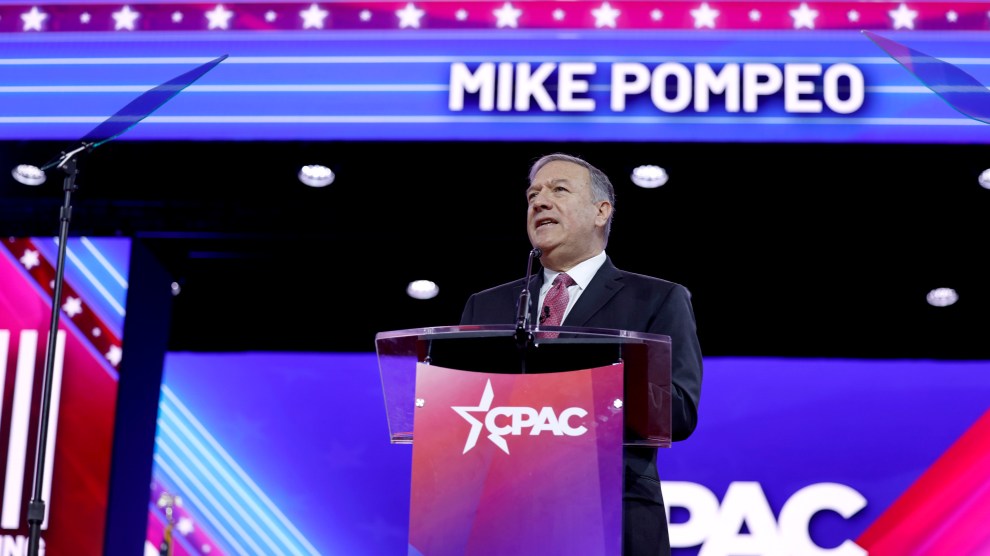
NATIONAL HARBOR, MARYLAND - MARCH 03: Former U.S. Secretary of State and Central Intelligence Agency (CIA) Director Mike Pompeo speaks during the annual Conservative Political Action Conference (CPAC) at the Gaylord National Resort Hotel And Convention Center on March 03, 2023 in National Harbor, Maryland. (Photo by Anna Moneymaker/Getty Images)
Mike Pompeo, Donald Trump’s former CIA Director and Secretary of State, was never going to be president. Now he’s admitted that he won’t be running in 2024. Few Republicans will think twice; a poll this month put him at 1 percent.
Pompeo has long harbored presidential ambitions. The problem was that his base never extended much beyond Republican apparatchiks for whom bombs over Baghdad is a career milestone, not a song. Having ruled himself out, he can now return to pasture as a distinguished fellow at the conservative Hudson Institute.
In another era, Pompeo might have been a plausible Republican nominee. After graduating first in his class in high school and at West Point, he served as a tank commander then left the military for Harvard Law. He later went into the defense industry with substantial financial backing from the Kochs. But as Susan Glasser reported in a 2019 New Yorker profile, he mostly failed in business anyway.
Nevertheless, he positioned himself as something of a corporate guru while successfully running for Congress in 2014 in his adopted hometown of Wichita, Kansas. During the 2016 primary, he warned that Trump would follow Barack Obama in being “an authoritarian President who ignored our Constitution.” He later supported Trump anyway and used his ties to Mike Pence to become CIA Director. Trump bumped up Pompeo to Secretary of State after firing Rex Tillerson by tweet.
As Glasser made clear in her profile, Pompeo’s singular talent was sucking up to the president. One former official told her he was “among the most sycophantic and obsequious people around Trump.” Another, a former ambassador, said, “He’s like a heat-seeking missile for Trump’s ass.” Trump, for his part, claimed, “I argue with everyone. Except Pompeo.”
Pompeo’s quiet acts of resistance included installing a small army of never-Trumpers at the State Department. Among them was Elliott Abrams, whom my colleague David Corn once called a specialist in “massacre denial. (Abrams claimed during his time in the Reagan administration that Guatemalan dictator Efraín Ríos Montt “brought considerable progress” on human rights; Ríos Montt was later convicted of genocide and was facing a retrial at the time of his death.)
Pompeo will be remembered for some whitewashing of his own. In a pre-campaign memoir, he made a point of minimizing the death of the murdered Washington Post columnist Jamal Khashoggi. The Post’s publisher called it “shocking and disappointing” that Pompeo had decided to spread “vile falsehoods” about Khashoggi “as a ploy to sell books.” (The former Secretary of State has taken higher stock of himself, writing in his memoir that he was “the only member of the president’s core national security team who made it through four years without resigning or getting fired.”)
On Friday, Pompeo insisted that his career might not yet be over, saying that “there remain many more opportunities for which the timing might be more fitting as presidential leadership becomes even more necessary.”
















